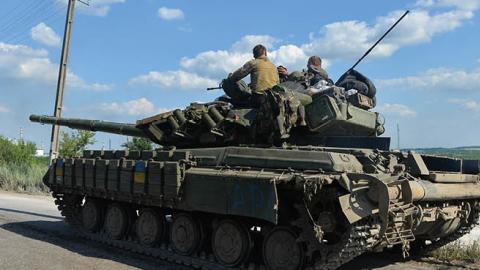Momentous occasions such as Russia’s invasion of Ukraine often have the effect of reinforcing in commentators and policy analysts the convictions and prescriptions they had previously espoused. In other words, “I favor policy X, and Russia’s invasion of Ukraine only reinforces the urgency of adopting policy X.” I recall availing myself of this trope when it came to the question of NATO enlargement and the meaning of 9/11. I averred that the uncertainties of the post-9/11 world made the case for NATO’s embrace of new members even more urgent.
Maybe so—but probably not. I viewed NATO enlargement then as essential to the stability of Central and Eastern Europe and a worthy expression of the shared political values of both current members and those aspiring to join. I still do. In this respect, 9/11 didn’t really make any difference.
I begin with this because Russia’s invasion of Ukraine has provoked a similar response. If you were in favor of Ukraine’s membership in NATO before 2/24, you are likely even more in favor of it now. If you believed Vladimir Putin’s Russia was a menace to its neighbors, including current NATO members such as the Baltic states of Estonia, Latvia, and Lithuania before 2/24/22, that conviction has likely been fortified since Russian armored columns crossed the border into Ukraine. On the other side of the discussion, if you opposed NATO’s post–Cold War enlargement as unduly provocative to Russia, Putin’s contra-NATO explanation for threatening and going to war in Ukraine likely proves to you your own prescience (even if you do not think it justifies Putin’s action).
This time, however, I’m an outlier. My view of the Russia problem (or Putin problem) has changed substantially since 2/24, as has my view of Ukraine. The reason is that the Russia or Putin problem itself changed drastically that day. By launching a war of conquest against a neighbor, Russia not only issued an existential challenge to Ukraine and a strategic challenge to the United States. Putin on that day also returned the question of morality or values to the foreground of international politics. He did so by showing the world in no uncertain terms what a tyrannical aggressor looks like. The place of Ukraine on the world stage likewise changed that day. The country became indisputably and above all else a victim of aggression. Finally, on that day came the challenge of what the United States and others would do in response. On 2/24, it looked as if the liberal international order with the United States as its undisputed leader and champion was cracking up in a way that would prove irreparable. By March 1, it no longer did. Ukraine, in defending itself bravely and credibly against Russian aggression, cast itself in the seemingly preposterous role of the savior of the liberal international order. Though the end is yet unknown, this reinvigoration and remoralization of the West in response to its most direct and bloodiest challenge since 9/11 is the least foreseen development in international politics since the collapse of the Soviet Union.
Many conservatives have been highly critical of the supposed failure of the Biden administration to deter Putin’s attack on Ukraine. They claim his administration has projected weakness, with the debacle of the abrupt abandonment of Afghanistan in the summer of 2021 as Exhibit A. Some conservatives and remaining liberal hawks also deem the United States to have been insufficiently supportive of Ukraine as far back as 2008. That was when NATO rebuffed a “Membership Action Plan” for Ukraine and Georgia in favor of a vague declaration that the two Russian neighbors would one day join the alliance.
Those who hold this opinion think the next pivotal moment of weakness came later in that same year, when Russian forces responded to a Georgian provocation by invading and occupying the breakaway Georgian regions of Abkhazia and South Ossetia and proclaiming their independence. The response to that incursion, in this view, was too weak to give Russia pause. An emboldened Putin soon thereafter intervened on the side of Bashir al-Assad in the Syrian civil war, with arms sales, the buildup of Russian naval and air bases, and irregular Russian mercenaries of the Wagner Group fighting on Assad’s side. By 2012, Russia was providing an out for an intervention-weary Barack Obama over enforcement of the American president’s declared “red line” warning Assad against use of chemical weapons. Russia advanced a proposal to confiscate them, which the United States accepted—as did Assad, knowing that Russian enforcement of this agreement would still leave him amply equipped to continue chemical attacks on his opponents. Again, critics found weakness in the failure to prevent Russia from reestablishing and consolidating a position of influence in the Middle East.
Next, in 2014, came Russia’s hybrid incursion into Ukraine—its takeover and annexation of Crimea and military incursion into Eastern Ukraine, for which Ukraine was entirely unprepared. Though condemnation and Western sanctions followed, and NATO enhanced its visibility in frontline member states such as the Baltics with rotational brigades and other measures, critics deemed these insufficient to check growing Russian restiveness. And then 2021–22 was upon us, with Russia building up a potential invasion force on Ukraine’s border and Putin expressing the view that Ukraine enjoyed no status as a sovereign country but rather was rightly a part of Russia.
The problem with what might be called the “weakness argument” is that it presents the problems as simple, the alternatives as clear, and the results that would have followed from different policy choices as inevitably better. That’s much too easy. The withdrawal from Afghanistan was indeed a disaster, but primarily a humanitarian one. Though militarily unnecessary and therefore foolish (except to those wedded to “endless war” complaints about U.S. engagement abroad), its geostrategic significance is questionable. As for Russia’s Syrian adventurism, the primary problem was Assad, who was responsible for an even larger humanitarian disaster, one that claimed 500,000 lives and displaced 13 million people, roiling regional, European, and American politics. President Obama’s steadfast commitment to do nothing about Assad’s brutality created favorable conditions for Russia to increase its influence, but Syria was not a Russian show.
When it came to Georgia in 2008 and Crimea/Donbas in 2014, the sanctions put in place were neither trivial nor effective. But Georgia and Ukraine are not members of NATO, and it would have been strange had the alliance and the United States treated them as if they were when Russia attacked. Nor was the 2008 rebuff of their desire to join NATO unreasonable. Though many Georgians and Ukrainians do indeed embrace Western values, their populations themselves did not express majority support for joining NATO, which has been a standard benchmark for membership eligibility in the post–Cold War era. Nor did their actual governance as of 2008 and ever since meet reasonable standards of performance for membership. This is to say nothing of the “realist” concern, not irrelevant, of the challenge of actually defending them.
What is more, we now know that the post-2014 response to Russian aggression in Ukraine was not limited to sanctions. The United States military, we can see in retrospect, was hardly idle, instead helping train up the Ukrainian military’s ability to resist a further Russian advance. That the United States did so quietly, so as not to provide a provocation Putin could use as a pretext for further aggression, also seems reasonable.
In short, even on the day before Putin’s move, prevention of a Russian armed attack on Ukraine was a worthy top priority for the United States in Europe but not one worth threatening to go to war with Russia over. The warnings of dire sanctions were entirely appropriate. The Biden administration’s attempt to rattle Putin’s complacency by revealing U.S. intelligence on his war aims and plans in advance was clever and worthy. The promises conveyed to Putin through back channels about the potential economic benefit he might gain from not invading were defensible: He and those under his patronage could have reaped billions from the Nord Stream 2 pipeline deal going through—notwithstanding the objection of our Central and Eastern European allies.
The willingness of the Biden administration to rule out U.S. boots on the ground in defense of Ukraine was also appropriate—especially in light of the retrospectively evident fact that American boots were already covertly on the ground in Ukraine, preparing Ukrainians for a fight and setting up channels for U.S. provision of battlefield and other intelligence as well as supply lines for military assistance. Likewise appropriate was the Biden administration’s emphatically ruling out compliance with any of Putin’s pre-war demands on NATO—from future enlargement to force deployments. Presumably, Germany had informed Putin that Berlin’s 2008 opposition to NATO membership for Georgia and Ukraine still stood, which meant their accession was as dead on February 23 as Putin professed to wish it. Through that date, Sweden and Finland had made no additional movement toward NATO membership beyond their long-time close cooperation with the alliance and especially its Nordic/Baltic members. The administration’s oft-repeated commitment to defend NATO allies in accordance with Article 5 of the Washington Treaty—that an attack on one is an attack on all—was unwavering.
Nevertheless, Putin’s bluster and military movement around Ukraine were making gains for him—in particular in the divergent perceptions between Western Europe and Eastern Europe over the threat he posed, all in the context of European dependency on Russia for natural gas. Putin was creating or widening fissures in the alliance as of February 23, and he could reasonably have hoped to exploit them further.
Altogether, the weeks prior to February 24 saw a morally respectable effort at carrot-and-stick diplomacy and signaling, without appeasement, whose purpose was to avert a devastating war. It failed.
Putin attacked. It seems clear that at the highest levels of the U.S. government, the expectation was that the Zelensky government would collapse and Kyiv would fall to the Russians in a matter of days. Certainly this was the consensus expectation in the U.S. foreign-policy establishment. Volodymyr Zelensky’s quip for the ages—“I don’t need a ride, I need ammunition”—was the response of a man who had been offered a ride to safety as lawful head of a government in exile, while a puppet government installed by Moscow would dissolve the Ukrainian state. Yes, Ukrainians were vowing that Ukraine would fight, but their defiant insistence that they could hold Russia off, while inspiring, also seemed like vainglory to many, including me.
It was not just the Ukrainian state on the line, however. Whether the United States chose to acknowledge the broader stakes or not, Putin’s naked aggression against Ukraine constituted a direct challenge to U.S.-led global order and liberal normative aspiration for international politics.
It’s easy to see as much by considering a possible alternative path for the first few days and weeks of the war. Let us suppose that Russia had gained control of Ukrainian airspace, and that its armor and infantry had advanced rapidly west, taking key cities in Ukraine’s east, and rapidly south, taking Kyiv.
Read in Commentary




















